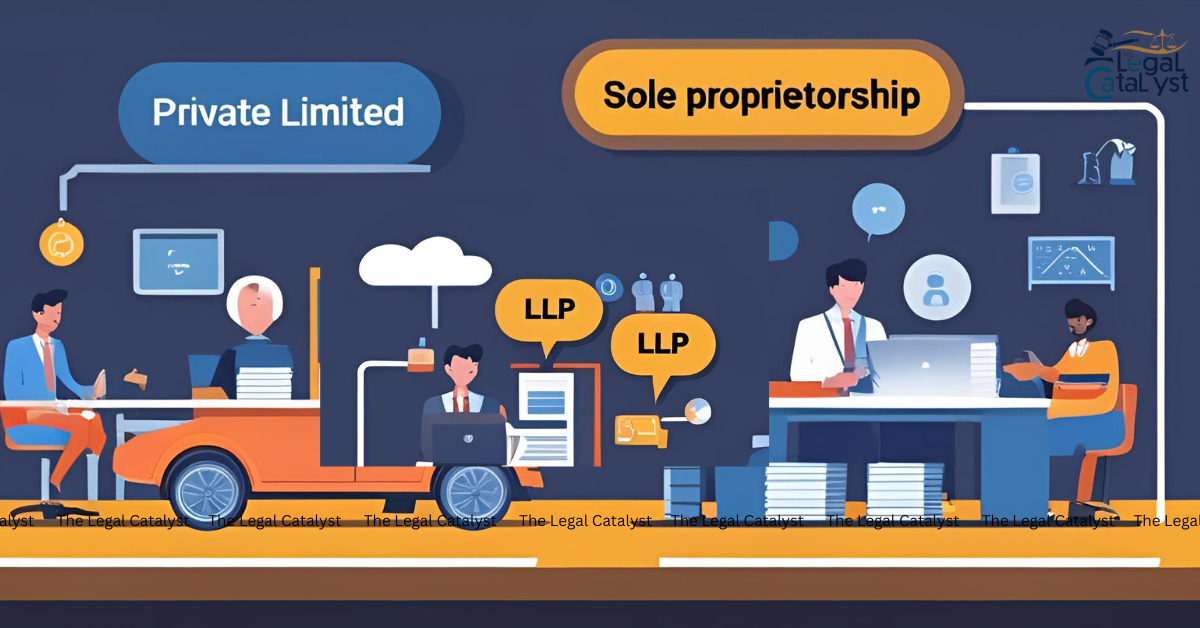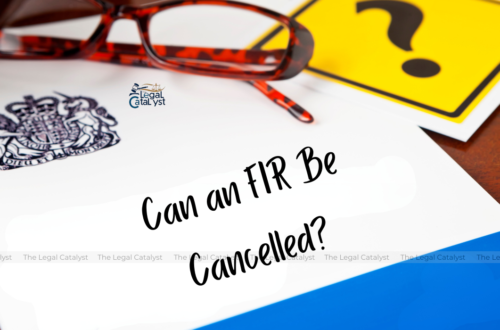Introduction
Choosing the correct business structure is one of the most important legal decisions for any entrepreneur. Whether you’re launching a startup, a family business, or a professional services firm, you have several options. The choice between a Private Limited Company, Limited Liability Partnership (LLP), and Sole Proprietorship can shape your business’s legal identity. It also affects taxation, compliance obligations, and even liability exposure.
In this article, we compare these three structures from a legal perspective, helping you decide what’s best for your venture.
Understanding Each Business Structure
1. Sole Proprietorship
A Sole Proprietorship is the simplest business structure. It is the most informal type. The business is owned and operated by one individual.
Legal Identity:
No separate legal entity; the owner and business are legally the same.
Registration & Compliance:
Minimal registration required. No formal incorporation under any specific law.
Taxation:
Taxed as individual income under the Income Tax Act, 1961.
Liability:
Unlimited personal liability. The owner is personally responsible for all debts and legal actions.
Best For:
Small traders, local service providers, freelancers, and businesses with low risk.
2. Limited Liability Partnership (LLP)
An LLP is a hybrid structure that combines the flexibility of a partnership with the limited liability of a company.
Legal Identity:
Separate legal entity under the Limited Liability Partnership Act, 2008.
Registration & Compliance:
Mandatory registration with the Ministry of Corporate Affairs (MCA). Requires LLP Agreement and annual filings.
Taxation:
Taxed as a partnership under the Income Tax Act. No dividend distribution tax (DDT).
Liability:
Limited liability for each partner, except in cases of fraud or negligence.
Best For:
Professional services, consulting firms, and co-founded businesses with moderate compliance needs.
Connect with us on Instagram – X – LinkedIn for daily updates, quizzes, and other materials.
3. Private Limited Company (Pvt. Ltd.)
A Private Limited Company is the most structured and legally recognized business form in India. It offers robust compliance. It also provides funding advantages.
Legal Identity:
A separate legal entity under the Companies Act, 2013.
Registration & Compliance:
Incorporation through MCA, DIN & DSC for directors, MOA & AOA documentation, annual filings, board meetings, and audit requirements.
Taxation:
Taxed as a corporate entity. Eligible for startup tax exemptions under certain conditions.
Liability:
Limited liability of shareholders up to the amount unpaid on shares.
Best For:
Startups seeking investment, scalable businesses, tech companies, and ventures planning for long-term growth.
Comparative Table: Legal Perspective
| Feature | Sole Proprietorship | LLP | Private Limited Company |
|---|---|---|---|
| Legal Recognition | Not a separate legal entity | Separate legal entity | Separate legal entity |
| Governing Law | None specifically | LLP Act, 2008 | Companies Act, 2013 |
| Liability | Unlimited | Limited to capital contribution | Limited to unpaid share capital |
| Formation Complexity | Very simple | Moderate | High |
| Compliance Requirements | Very low | Moderate | High |
| Funding Options | Limited | Moderate | Extensive (can raise equity) |
| Taxation | Personal income slab | Partnership tax regime | Corporate tax regime |
| Conversion Options | Difficult | Convertible to Company | Already formal & structured |
Which Business Structure Is Right For You? – Legal Takeaways
✅ Choose Sole Proprietorship if:
- You’re starting small and informally.
- You want minimal compliance and costs.
- You’re okay with personal liability risks.
✅ Choose LLP if:
- You have a co-founder or partner.
- You want limited liability with easier compliance than a company.
- You’re offering professional services or consulting.
✅ Choose Private Limited Company if:
- You plan to raise external funding.
- You want a professional image and limited liability.
- You’re looking for scalability and long-term operations.
Legal Risks and Responsibilities
Each structure carries unique legal obligations:
- Sole Proprietorship: Exposed to unlimited personal legal and financial risk.
- LLP: Can be dissolved by order of a tribunal if partners are found guilty of fraud or misconduct.
- Pvt. Ltd. Company: Directors can be held personally liable in cases of non-compliance, fraud, or wilful misconduct. This liability is specified under Section 447 and 448 of the Companies Act.
Conclusion
From a legal standpoint, the decision must be based on your business goals and risk appetite. Consider your funding needs and willingness to comply with regulatory norms. Sole Proprietorships offer convenience. LLPs strike a balance between simplicity and protection. Private Limited Companies provide the highest level of legal and operational credibility.
Choose wisely — because the wrong legal structure can limit your growth or expose you to avoidable legal risks.
Frequently Asked Questions (FAQs)
Q1: Can I convert a Sole Proprietorship into a Private Limited Company?
Yes, but it involves legal procedures such as business transfer agreement, incorporation, and obtaining fresh registrations.
Q2: Is LLP registration compulsory in India?
Yes, all LLPs must be registered under the LLP Act, 2008 with the MCA.
Q3: Which structure is preferred by investors?
Private Limited Companies are generally preferred for venture capital and private equity funding.
Also Read
The Jury System in India
Legal Checklist for Running an E-Commerce Website in India






